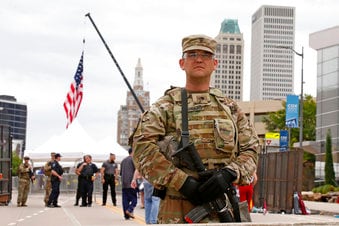The National Guard has already have an unprecedentedly busy year, with tens of thousands of troops mobilized since March in support of both coronavirus pandemic response and in support of local law enforcement after nationwide protests against the killing of George Floyd broke out in May.
Now, as many of those troops have been demobilized, the Guard’s historically busiest time of the year is just beginning: hurricane season.
“What we’re seeing this year is there is an increased indication of the weather pattern that would be about ... 30 percent more storms this year,” Air Force Maj. Gen. Steven Nordhaus, the National Guard Bureau’s director of operations, told reporters Monday. “So where a normal year might be eight to 12, they’re tracking maybe as many as 16. We’ve already had three.”
Two states regularly either hit or called on for support during hurricane season, are prepared to send thousands in support of natural disaster relief, in addition to the thousands they’ve already activated this year.
At one point in early June, Nordhaus said, about 120,000 of the Guard’s 450,000 personnel were mobilized, including overseas deployments pandemic response, law enforcement support and other domestic missions.
Florida has about 8,000 troops ready to respond, Air Force Maj. Gen. James Eifert, that state’s adjutant general, told reporters. Texas, meanwhile, has about 21,000 troops who aren’t already mobilized for COVID-19 testing support, according to Army Maj. Gen. Tracy Norris, the Texas adjutant general.
“In Florida, I can tell you it’s almost impossible to not have people who have not done all of those things,” Eifert said, echoing Norris’ comment that it was “highly probable” her troops would do at least two, if not three, of those missions this year.
But during an active pandemic, there are extra precautions to take.
“We know things will be different this year,” Nordhaus said. “Social distancing, [personal protective equipment], screening and testing, sheltering and other impacts will cause us to change how we respond.”
RELATED

State and territory AGs are discussing the logistics of screening and testing prior to mobilizing much like active-duty units, “to make sure that you’re not taking the virus to the next state during the operations,” Nordhaus said.
To prevent spreading COVID-19 among each other and to members of the public, there will be PPE requirements, as well as regular diagnostic testing.
“I believe the states are focused on some type of screening and testing daily through the operation and on [demobilizing] once again, some type of screening and testing, to make sure that we’re taking care of those soldiers and airman,” he added.
They won’t, however, be able to quarantine before activation, because natural disaster orders come on quick turnaround, and most Guardsmen have full-time civilian jobs in the meantime. A post-mobilization quarantine might also not be feasible, for the same reason.
“The biggest thing for us at the National Guard is, we have to be well in order to respond,” Norris said, adding that gloves, masks and hand-washing have become second nature to her troops.
Meghann Myers is the Pentagon bureau chief at Military Times. She covers operations, policy, personnel, leadership and other issues affecting service members.




